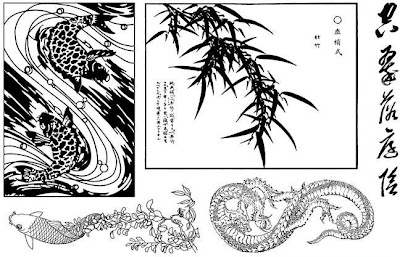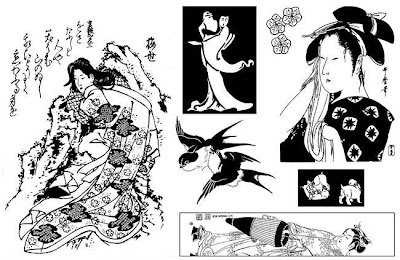I've also been working on a submission for The Little Dreamer Designs' Apprentice program. I've come up with a pack of 3 papers and 3 elements, and am pleased with most everything except one of the elements, which I have plenty of time to work on, as the final deadline isn't even until February 29th... I can't imagine how many submissions they'll have to wade through--seems like a lot of work to me! But it's wonderful practice, even if it takes me forever, and it's a terrific opportunity to break into the selling portion of digiscrapping. I mean, if I'm going to spend this kind of time on something, it really should have some revenue attached to it...
Also, the Year of the Ox (2009) and Year of the Tiger (2010) sheets will be out in February. I'm working on a floral/faunal sheet next. I've discovered some really cool tricks doing the digiscrapping that I can apply to the rubber stamp designing, even though designing for rubber stamps requires that you work in 600 dpi, and only 2 colors, black and white (no grayscale). Makes shading much more difficult, since also anything smaller than about 5 pixels wide tends to disappear, or merge with neighboring lines. But I think I've managed a workaround...
Couple of things about recent layouts that I learned or liked:

(Click for credits)
I like how those flowers in the background turned out--reminded me of Helena Jole's beautiful potato prints (heck, I tried to find the exact post where she explains how to do it, but I can't find it). I also used another of my crazy backgrounds--this one was black embossing powder over Versamark that I just randomly swiped over a piece of cardstock... btw, helps if you cut your cardstock to 8x8 before you get started (so it'll fit on a standard scanner bed). On the other hand, for textures, you can easily just stretch your 8.5 x 11" background to 12x12 -- nobody's going to know how it really started out!
I just finished this layout for both the White challenge at Little Dreamer Designs and the Just My Type challenge at Designer Digitals. I ended up using the freebie by Leora Sanford for the white and blue papers, but the rest is mine. I think I'm channeling Stefdesign over at 2Peas, though, with my little train...

(Click on photo for credits)
I've also cranked out a couple of clean nature designs, which I think I really do best, cuz there's nothing to them. Heh. On the other hand, that's not going to get me anywhere as a designer, because really, all I use pretty much is one background, a couple of photos, and some words... Recently I've done Rock, and Icicle...




























